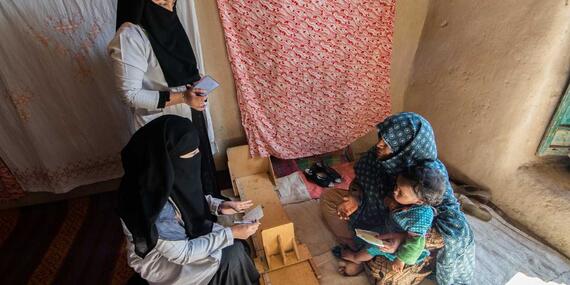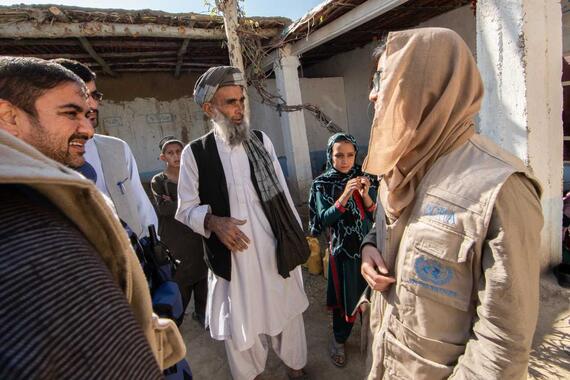Afghanistan: "I will risk my life to help others"

Amina* joined an international non-governmental organization (INGO) in Afghanistan as the provincial Head of Office more than a year ago. She had worked in the humanitarian sector for over a decade, but taking on this role in a context where Afghan women face increasingly severe restrictions was more than just an achievement: it was an opportunity to reach more women and inspire young girls.
Inspired to make a change
Amina explains: “I was so excited to be appointed the provincial Head of Office. It gave me an opportunity to do more to help women and children in my area. Physical access to people in need had improved at the time, and I was happy that I could work with my team to reach more women and girls, which is my passion. I was so motivated to inspire positive change in people’s lives.
“Today, I am so sad and heartbroken. I have more than 60 women in my team, most of whom are now grounded or working from home because of the ban.”
We are women, not criminals
Since the Taliban de facto authorities took over Afghanistan in August 2021, they have issued a slew of restrictive measures that have systematically excluded women and girls from all aspects of life. On 24 December, they issued an edict banning Afghan women from working for national and international NGOs. This year, on 4 April, the same ban was officially extended to include Afghan women working for United Nations entities in the country.
“I find myself constrained just because I am a woman,” said Amina. “Some of the provincial de facto authorities refuse to engage directly with me because I am a woman. They do not accept me, and that affects my ability to deliver and to do my job.
“Some provincial directors agree to meet with me, but they do so outside their offices to avoid being seen. I am not a criminal. Sometimes I am forced to send a man to represent me in meetings with local authorities, which can complicate operations.”
Critical decisions are made in those meetings, such as resource allocation and prioritization, but Amina cannot contribute to the discussions. In addition, male colleagues may sometimes be less familiar with the programmes, mainly those targeting women and girls.

“Since the ban on Afghan women aid workers in December last year, we have been engaging with local authorities here, some of whom, I believe, understand our situation. They give us short-term verbal approvals for women to work from their homes or in the field. They are not allowed to go to their offices. That, in addition to the exemptions for women working in health and nutrition, has enabled us to continue delivering assistance to those in critical need. But it is limiting and not enough.
“Women aid workers need to be in their offices where they belong, and to do their work effectively. The home-to-field modality is not safe for women as there are no security guarantees. It makes women feel like they are committing a crime, when all they want to do is help other women and save lives.”
Afghanistan needs its people right now
“This year, the humanitarian situation is bad for many families. Many people need help. We must expand our projects and sustain the response. But we cannot do that if most of our female colleagues are not able to work.
“We are implementing several programmes, including health, nutrition, protection, multi-purpose cash, food aid and livelihoods support, targeting more than 2,000 families. We want to expand, but the restrictions on women aid workers are constraining us.
“The quality of our work has declined because we are unable to access the facilities in the office, or to monitor and assess some of our projects outside the health and nutrition programmes. In our line of work seeing is believing, so we need to be in the field to have a comprehensive understanding of the situation and to monitor progress on all our projects.
“In addition, since the ban was imposed, there has been an increase in the number of checkpoints that are deployed to enforce the ban. Even the exemption for women in the health and nutrition sector is impacted by delays at checkpoints. The mahram [male family member] requirement is also not making life easy for women, mainly female-headed families. I am the breadwinner in a family of eight, and men in my family are also affected by these restrictive measures.”
I will risk my life to save others
“I am tired of watching our people suffer and face potential death when we can help them. I have decided to take the risk for humanity. I will continue to serve my people.
“They cannot die because of these bans. If we all die, who will they ban? I cannot allow our people to suffer when we are here and ready to help them. But I cannot do it alone. I need my team back in the office.
“Just recently, we met a man whose two arms were amputated. I imagined how he was going to survive without assistance. I was happy that we helped him, together with his family. We should worry more about helping our people to stay alive than about banning women.
“I am also reminded of a widowed mother of two children who were desperate for help. They needed food urgently, and if we had not sneaked out and breached the ban, maybe she would be forced to sell her children for money or food. Stories such as these motivate some of us to take risks and continue to help other people. But we need support at all levels.”
I worry for my daughter
“Being a mother of four children, one of whom is a girl, gets me worried every day. My six-year-old daughter has big dreams; she wants to be a medical doctor when she grows up because she feels she needs to help other people. She is aware of the bans, and she is also disappointed that girls older than her are not allowed to go to school. She is worried that she may not realize her dreams.”
We need international solidarity
“Advocacy for the reversal of the bans must continue. But we must also encourage donors to provide more funding. We thank OCHA for its continued efforts in resource mobilization and advocacy for women’s and girls’ rights.
“Afghanistan is in a bad situation right now. Some children and widows cannot survive without our support. They face hunger, disease and destitution. Let’s unite and save lives while we continue to advocate and engage.”
*Name changed
